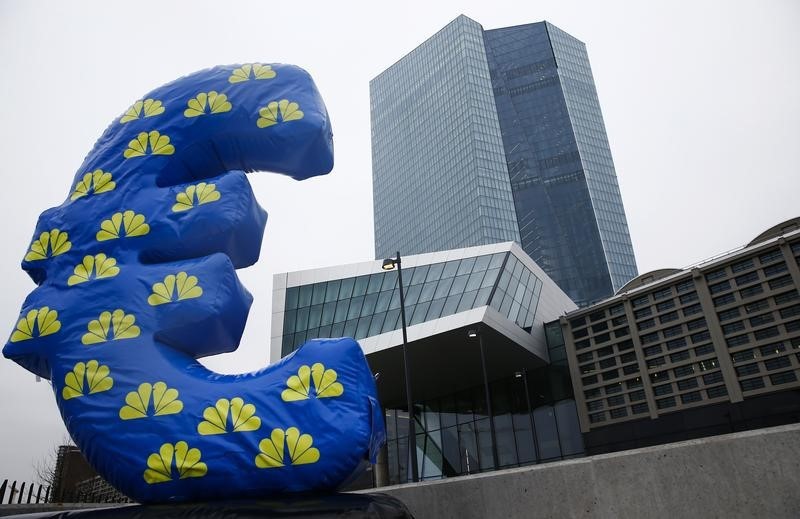By Sarah White and Valentina Za
MADRID/MILAN (Reuters) - The euro zone credit cycle is a whisker away from turning positive but don't expect a rapid recovery.
Bank lending to the private sector fell 0.1 percent in February, data from the European Central Bank (ECB) showed on Thursday, dashing expectations for an increase but inching ever closer to positive growth after nearly three years of contraction.
While ECB President Mario Draghi hailed a resurgent demand from companies for credit this week on the back of his cheap loans for banks, lenders and businesses are more circumspect about the prospects for a strong upswing.
"The scope of lending is not really widening, it's more credit for the same companies," said Camilo Pereira, chairman of one of Spain's biggest garden center businesses, Fronda, which has dealings with half a dozen banks.
Banks' unwillingness to lend and businesses' reluctance to take on fresh debt have been at the heart of euro zone stagnation. A resumption of credit growth would signal a big hurdle to the bloc's recovery had been lifted.
The ECB has been throwing money at the problem, keeping interest rates at record lows and offering banks hundreds of billions of euros in cheap loans to lend more to businesses.
But funding is not a problem for the banks. Their funding costs have been down at pre-debt crisis levels for more than six months as yield-hungry investors snap up bank debt.
The problem is capital.
Making fresh loans requires lenders to set aside more capital to cover the risk of default, a tall order for some banks in the euro zone, where a new European banking regulator is taking a tougher stance on capital levels and capital quality.
Unlike the United States, which moved quickly to close struggling lenders and recapitalize the healthy ones in the wake of the financial crisis, Europe, where many smaller lenders are politically connected, has failed to take a big bang approach.
The International Monetary Fund has estimated that nearly three-quarters of the euro zone's 3,600 plus banks need to be overhauled before they can meet the demand for credit when the euro zone economy fully recovers.
In Italy, bad debts are still climbing, making it even more difficult to make new loans, as bankers in some regions hope that a resumption of economic growth will resolve the issue.
WINNERS AND LOSERS
In Spain, where the banking system has been overhauled in the wake of a disastrous property bubble, Bankia is making a big push into lending to small businesses as part of a restructuring agreement with the European Commission. The bank borrowed 2.7 billion euros from the ECB in September to finance its campaign.
Bankia said it had lent out half of the 2.7 billion so far and that four out of five of the loans are to new customers. But after nearly collapsing under the weight of ill-advised property loans, the bank is cautious.
"There is growth, but it's not homogenous, there are winners and losers, and that is going to become more marked as some companies grow more," said Juan Luis Vidal, head of small business lending at Bankia.
Spain reported a jump in demand for business loans in the latest ECB bank lending survey but Jose San Roman, the chief executive of Ilion, a Madrid-based animation studio, cannot get all of the funding he needs to expand.
In a country with nearly 24 percent unemployment, his plan to double his workforce to at least 500 is significant but some of his projects are being stalled.
"Financial entities are looking for any excuse to withhold decision-making," he said. "They are using every excuse to say no, demanding more guarantees from the parent holding company, or cash to set aside in an account."
A recent burst of demand among banks earlier this month for the ECB's cheap loans has raised expectations that it will push borrowing costs for businesses down further and translate into increased credit.
The average cost of borrowing for corporations was 2.41 percent in January, the lowest since records began at the ECB in 2003.
Expectations of improving growth in the euro zone, provided the crisis in Greece and the conflict in the Ukraine does not throw things off course, are also a positive.
But with caution still very much the watchword, a return to the high single digit growth rates for bank lending in the euro zone seen before the global financial crisis is not expected anytime soon.
"We're still at the beginning of the process that would lead to raising new financing, we're are waiting to confirm our expectations," said Simona Campo, chief financial officer of Italian healthcare software group NoemaLife.
